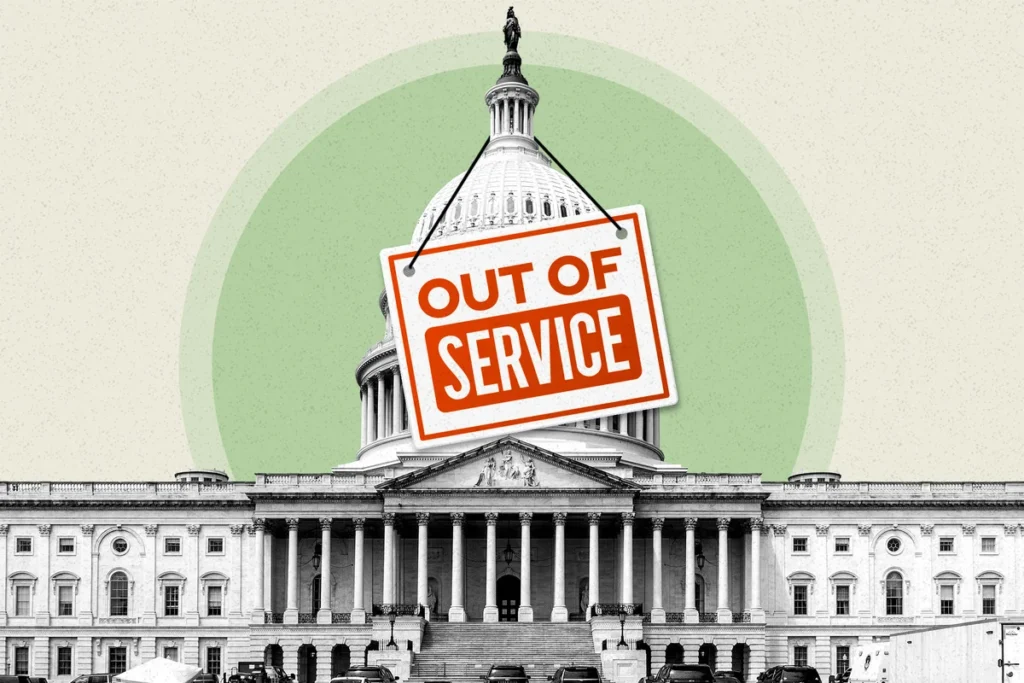The Refund Delay Everyone’s Talking About
You filed your taxes. You expected that refund by now. But it’s been weeks, and nothing’s hit your account.
You’re not alone.
Because of the ongoing federal government shutdown, millions of taxpayers across the country are waiting on delayed refunds. The IRS is running with limited staff, and that means slower processing, longer call times, and less help when you try to reach someone.
While lawmakers argue over funding, the IRS is basically on pause. But your bills, rent, and grocery costs keep moving.
This article breaks down what’s happening inside the IRS during the 2025 shutdown, how it affects refunds, what you can still do, and how Prado Tax Services is helping people stay tax-ready even when the government isn’t.
For official updates, the IRS outlines which services are active and which are paused here:
https://www.irs.gov/newsroom/irs-operations-during-appropriations-lapse
What’s This Shutdown All About?
Every year, Congress has to agree on a budget to keep the government funded. When that doesn’t happen, agencies start running out of money, and that’s when we get a government shutdown.
That’s exactly what happened on October 1, 2025. Lawmakers missed the budget deadline, and without a new funding bill or even a short-term extension, large parts of the federal government had to hit pause.
The IRS is one of them. According to Federal News Network, “only 53% of its employees will remain working” under the agency’s contingency plan. That means almost half of the IRS workforce is on furlough right now, people who normally handle tax returns, process refunds, answer calls, and mail out notices.
The official IRS employee notice confirms this, stating that “an IRS-wide furlough began October 8, 2025, for everyone except already-identified excepted and exempt employees.” You can see the IRS announcement here: https://www.irs.gov/newsroom/irs-employee-emergency-news.
When that many people are off the clock, delays are unavoidable. Refunds, audit responses, and even basic correspondence can take much longer than usual.
So while electronic filing systems still work, the people behind the process are stretched thin. And that’s where the ripple effects on taxpayers really start showing up.
How the IRS Is Affected
When the government shuts down, the IRS doesn’t completely close, but it definitely doesn’t run like normal.
According to the agency’s official statement, operations are “limited during the lapse in appropriations,” which means only a portion of employees are still working. The rest are furloughed until Congress passes new funding.
Here’s what that actually looks like for taxpayers right now:
- Regular tax deadlines still apply.
Even though the IRS is short-staffed, all filing and payment deadlines remain in place. That includes individual, corporate, and payroll tax deadlines. The IRS made it clear that “all tax deadlines remain in effect.” So if you owe taxes or have an upcoming due date, you still need to file or pay on time.
- The IRS website and automated tools are still running.
IRS.gov is live, and most online tools, including “Where’s My Refund?” and IRS Direct Pay, are available. You can still check refund status, make payments, and access basic tax information. - Electronic filings and payments continue to process.
E-filed returns and online payments are being accepted and processed automatically. The IRS said that “payments received, whether by check or electronic means, will continue to be processed.” Direct-deposit refunds for fully automated returns may still go through, though slower than usual. - Walk-in and phone services are mostly closed.
The IRS confirmed that all Taxpayer Assistance Centers (TACs) are closed during the shutdown, and all in-person appointments, including those with the Taxpayer Advocate Service and Appeals, are canceled until further notice. Phone support is extremely limited, with most live representatives unavailable. - Paper returns and mail are piling up.
The IRS stated that “paper returns will be delayed until full government operations resume,” and that it will not process most mailed correspondence during the shutdown. That means if you mailed your return, an amended return, or a response to a notice, it will likely sit unopened until staff return. - Some enforcement and investigation work continues.
A small number of employees remain on duty for law enforcement, criminal investigations, and system security. But many routine audits, compliance checks, and collections are paused until the government reopens.
In short, the IRS is running on autopilot, automated systems are working, but most of the people behind them aren’t. If your refund requires any manual review or your tax issue needs a human response, it’ll take longer than usual.
Why Your Refund Might Be Delayed
A government shutdown slows the IRS right where it matters most, refund processing.
Even if you filed online, every return still goes through layers of checks before that refund hits your account. Some of those steps are automated, but a lot still need a real person to sign off. And right now, almost half the IRS workforce is furloughed, which means fewer hands moving things along.
The “Where’s My Refund?” tool still works, but updates are lagging. Many people say their status hasn’t changed in weeks. Mail-in returns are in an even worse spot since paper processing stops completely during shutdowns.
Think of someone like Carla, who filed her taxes in early October, expecting her refund to cover rent and bills. Normally, she’d see the money in about three weeks. But this year, she’s been checking her IRS status page for a month with no change. It’s not because she did something wrong; her return is just sitting in a queue waiting for someone who isn’t there yet.
When the government reopens, the IRS doesn’t just pick up where it left off. They have to recall staff, restart systems, and work through thousands of pending returns. That takes time, and the backlog means more waiting even after things are “back to normal.”
Knowing that upfront can save a lot of stress and help you plan around the delay instead of being blindsided by it.
What You Can Do Right Now
Waiting on a tax refund you can’t control is tough, but there are a few smart moves that can make it easier to ride out the delay.
- Double-check your filing status
If you filed on your own, log in to your e-file provider or the IRS site to confirm your return was actually accepted. Sometimes refunds stall simply because the return was never fully transmitted.
- Keep an eye on the IRS tools, just not every hour.
You can check your status here: https://www.irs.gov/refunds. The site updates once a day, usually overnight. If it still says “processing,” that’s normal right now. Refreshing it constantly won’t make the refund move faster.
- Plan your cash flow like the refund’s not coming soon.
If you depend on your refund for rent, bills, or credit payments, try adjusting your budget as if the money will take another month or two. It’s not ideal, but it helps you stay ahead instead of scrambling later.
- Don’t send duplicate returns or extra forms.
Filing again or mailing copies won’t help and might even slow things down more once the IRS is back at full speed.
- Get professional help if something looks off.
If you receive an IRS or FTB notice during the shutdown, deadlines can still apply even if response times are delayed. It’s a good time to have a tax pro check your situation. Prado Tax Services has a full guide on what to do if you get an IRS or FTB notice.
- Keep your records ready.
When the IRS resumes normal operations, it may request additional verification for some refunds. Having your W-2s, 1099s, and bank statements organized now can save you time later.
And if you run a small business or freelance, remember that this slowdown doesn’t pause your filing or estimated payment deadlines. We, at Prado Tax Services, can help you stay compliant and plan for cash flow even while things at the federal level are delayed.
How The Government Shutdown Affects Small Businesses and Contractors

The shutdown isn’t just slowing down personal refunds. It’s also hitting small businesses and self-employed workers who depend on the government in ways most people don’t realize.
When federal agencies pause, contracts and payments pause too. Small businesses that rely on government work, like IT vendors, maintenance providers, or transportation services, can go weeks without getting paid. For some, that means cash flow gets tight fast.
Tax credits and loans are another pain point. The Small Business Administration’s loan approvals and funding programs are largely on hold. That can leave new startups or existing businesses stuck mid-process with no timeline for when things will move again.
This kind of uncertainty makes planning tough. Expenses keep rolling in, but expected payments or refunds are delayed. That’s where smart bookkeeping and tax planning really matter.
We, at Prado Tax Services, help small business owners in and around the Bay Area, California, manage their finances even during times like this. We track pending filings, keep business tax deadlines on schedule, and plan around potential refund or credit delays so your business stays steady.
If your company’s still waiting on a refund or you’re unsure how the shutdown might affect your next tax payment, we can review your books, help you adjust quarterly estimates, and find ways to ease short-term cash strain.
Shutdowns may be out of your control, but your business strategy doesn’t have to be.
How We Can Help You
We know how frustrating it is to feel stuck waiting for a refund that just isn’t coming. You filed, you did everything right, and now you’re caught in something you can’t control. That’s where we step in.
The IRS might be on hold, but we’re not. We’re helping people stay calm and ahead of the curve, checking their filings, following up on refunds, and catching small mistakes before they become bigger headaches.
If you’re dealing with an IRS or FTB notice, we’ll walk you through what it means and how to respond. If your refund’s delayed, we’ll help verify your filing status, confirm that your return was accepted, and advise what to expect once the IRS is fully back.
We also work with small business owners and self-employed professionals who are juggling cash flow issues because of federal payment delays. From adjusting quarterly estimates to planning year-end deductions, we help you manage your money smartly until things get back to normal.
You can reach us anytime at https://pradotaxservices.com/contact-us/ or call at (888)829-1125. We’ll keep working, so you don’t have to face the shutdown chaos alone.
Wrapping It Up
The government shutdown might have the IRS on hold, but your tax life doesn’t have to stall with it. Refunds will come through eventually, just slower than anyone would like.
In the meantime, the best thing you can do is stay informed, stay organized, and get a little professional help when you need it.
We, at Prado Tax Services, keep working in San Leandro, CA, while Washington works things out. Whether it’s tracking a refund, handling a notice, or planning for next year’s taxes, we’re here to make sure you’re ready for whatever happens next.
You’ve got enough to worry about right now; your taxes shouldn’t be one of them.

